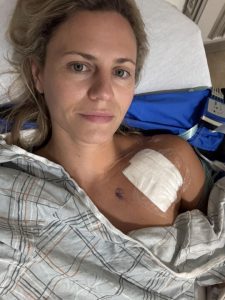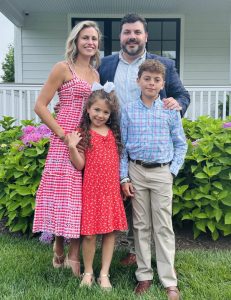by Frances S.
 In the spring of 2025, I went for my yearly physical and it was discovered via EKG that I was having a decent amount of premature ventricular contractions or PVCS. After a thorough health history, which included some anecdotes of my past as a very active person, my doctor recommended I wear a holter monitor for 48 hours to get more data on how my heart was behaving. During this 48 hr period, coincidentally, I did have a fainting episode in the middle of the night when I awoke not feeling well. The Holter monitor data also showed that the number of my PVCS were significant enough and warranted a follow up with a cardiologist. I was not too concerned because over my lifetime as a young athlete and fit adult (I am now 41 and a fitness trainer), I never had complaints or symptoms that I thought were heart related. I had definitely felt moments of my heart racing but I dismissed these as caffeine related, anxiety induced, or simply managing life, slightly sleep deprived and running around with two kids!
In the spring of 2025, I went for my yearly physical and it was discovered via EKG that I was having a decent amount of premature ventricular contractions or PVCS. After a thorough health history, which included some anecdotes of my past as a very active person, my doctor recommended I wear a holter monitor for 48 hours to get more data on how my heart was behaving. During this 48 hr period, coincidentally, I did have a fainting episode in the middle of the night when I awoke not feeling well. The Holter monitor data also showed that the number of my PVCS were significant enough and warranted a follow up with a cardiologist. I was not too concerned because over my lifetime as a young athlete and fit adult (I am now 41 and a fitness trainer), I never had complaints or symptoms that I thought were heart related. I had definitely felt moments of my heart racing but I dismissed these as caffeine related, anxiety induced, or simply managing life, slightly sleep deprived and running around with two kids!“I never had complaints or symptoms that I thought were heart related.”
My cardiologist and his team ordered a stress test echocardiogram and a cardiac MRI. These tests revealed that an electrical issue was occurring because of the physical damage to my right ventricle. The findings showed that I have a rare genetic heart condition called Arrhythmogenic Right Ventricular Cardiomyopathy (commonly referred to as “ARVC”). Unfortunately, patients with ARVC are at high risk for Sudden Cardiac Arrest. I met with both a genetics counselor and an Electrophysiologist who carefully and thoughtfully explained my condition and presented the treatment that was necessary, which meant I would be getting an Implantable Cardioverter Defibrillator or ICD. This news was utterly shocking and there were many, many tears. Fortunately, my team of doctors enveloped me in their expertise and kindness, answering all my questions and assuring me that I would live a normal life after the procedure.
An ICD is an incredible device that provides pacing and can also deliver life-saving shock to the heart if it needs it. Many people with ICDs refer to them as their “Guardian Angel,” naturally, as it’s there to protect you. It watches and effectively listens to your heart, communicating with the device clinic and can be monitored by your doctor. In early June 2025, I had the procedure done with no complications. I also found out through genetic testing, that I have the DSP gene mutation, solidifying the confirmation of my ARVC diagnosis because the DSP mutation is linked to cardiomyopathies.
“When you are diagnosed with a heart condition, you are impacted mentally and emotionally.”
It has been a lot to digest in a short amount of time. I continue to learn as much as a can about ARVC, which is how I found SADS. It was a relief to find an organization dedicated to educating and assisting people like me. When you are diagnosed with a heart condition, you are impacted mentally and emotionally. For me, there were early days of heartbreak over the ARVC diagnosis because I would have to make changes to my active lifestyle. But, with time and support I have started to feel better and more optimistic. I have focused on the good in my life and have tremendous gratitude that this diagnosis came before it was too late. Getting my ICD means I have protection. I continue to find silver linings and strength with my incredible husband, children, family and network of friends. I feel passionate about sharing my experience in the hopes that someone else can find their way to SADS as well. Connection and community are essential for healing, acceptance, and moving forward.

